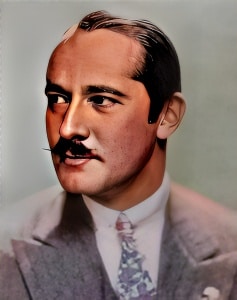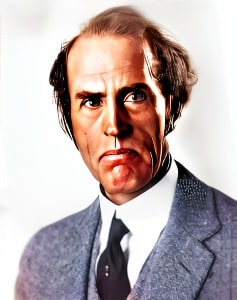 Earl Schenck, born on July 19, 1887, in Roxbury, Massachusetts, was a versatile character actor whose career spanned the formative years of American cinema.
Earl Schenck, born on July 19, 1887, in Roxbury, Massachusetts, was a versatile character actor whose career spanned the formative years of American cinema.
Known for his ability to portray a wide range of characters, he made a significant impact in both silent and early sound films. One of his notable roles was in the 1922 silent film “ Salome,” directed by Charles Bryant, where he contributed to the film’s provocative and artistic interpretation of Oscar Wilde’s one-act play.
Before making his mark in the world of cinema, Earl Schenck began his career on the prestigious stages of Broadway in New York City. His experience in the theater provided him with a strong foundation in acting and prepared him for a successful transition to the emerging medium of motion pictures. His ability to convey a variety of emotions and his distinctive presence on stage quickly caught the attention of filmmakers.
Schenck’s silent film career commenced in the early 1910s. His versatility as an actor allowed him to seamlessly transition between different genres, from dramas to comedies and adventure films. He took on a wide array of roles, showcasing his ability to bring depth and authenticity to the characters he portrayed.
One of the early milestones in Schenck’s career was his role in the 1918 silent film “The Road Through the Dark.” Directed by Edmund Mortimer, this film was an example of Schenck’s versatility, as he adeptly portrayed a supporting character who added depth to the narrative. The film demonstrated his ability to contribute to the success of a wide range of cinematic endeavors.
The advent of sound cinema in the late 1920s posed a challenge for many silent film actors, but Earl Schenck adeptly adapted to the new medium. His ability to portray a variety of characters, including authoritative figures, comedic roles, and supporting characters, remained a valuable asset in the early days of sound cinema.
Now, turning to his role in “ Salome” (1922), directed by Charles Bryant, the film is celebrated for its provocative and artistic interpretation of Oscar Wilde’s one-act play. In this cinematic adaptation, Schenck played the character of Jokanaan, also known as John the Baptist. Jokanaan is a pivotal character in the story, as his stern opposition to Salome’s desires drives much of the film’s tension. Schenck’s portrayal added depth and authenticity to the character, enhancing the film’s enigmatic and evocative atmosphere.
“ Salome” is renowned for its avant-garde art direction, innovative storytelling techniques, and the iconic performance of Alla Nazimova as Salome. The ensemble cast, including Earl Schenck, contributed to the film’s lasting impact in the realm of silent cinema. His role as Jokanaan, the prophetic and forbidding figure, remains a significant part of this cinematic interpretation of a timeless and provocative tale.
While Earl Schenck may not have achieved the same level of recognition as leading stars of his era, his contributions to the film industry are remarkable. His versatility as an actor and his ability to adapt to the evolving landscape of cinema showcased his dedication to the craft of acting and his enduring impact on the early days of Hollywood.
Earl Schenck’s legacy stands as a testament to the talent and dedication of character actors who played an integral role in shaping the early film industry. His performances continue to be appreciated by film enthusiasts and historians, and his versatile contributions to both silent and sound cinema are a testament to his lasting impact on American cinema during its formative years.
Loading live eBay listings...




